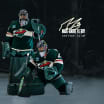"You can't decide, 'Hey, let's have emotions out there,'" Koivu said. "It just happens in certain plays. Sure, when you play at home and you get a couple quick goals, the crowd gets into it, everyone gets up."
Much of that comes from within. There are as many unique ways of self-motivation as there are home locker stalls at Xcel Energy Center. "There's a time and a place to get fired up, and you see some guys get fired up a little quicker than others," Suter said. "That's just part of the game; every player's different, and every leader leads in a different way. Every player shows emotion in a different way."
And from a group perspective, fans and media are only privy to a small sample of a team's personalities and demeanors.
Behind the curtain, there are bonds being formed as brothers, sons and fathers spend more time together than they do with their own families. Those kinds of connections breed collective emotional attributes.
"I don't think you guys know all of it," Koivu said to reporters. "When the doors are closed, I think there's emotions on it and there needs to be emotions and there's things that need to be handled inside of the team. Once you get out there [on the ice], I think you've got to be yourself."
But no matter their source, passion and personality have to be authentic.
"We've all had the careers we've had because of who we are," Suter said. "You try to change, and people see that as a front. Your teammates, they see that."
Added Koivu: "You can't fake it."
So it can't be conjured, but it can be encouraged. Exhibit A: Boudreau's decision to bench both his power-play units for malperformance Thursday. The wily bench boss has never been afraid to change lines or defensive pairings in an effort to draw better results.
"You do what you have to do," Boudreau said Friday with a slight grin. "Sometimes, you have to spur it on; hopefully somebody on the ice can create that emotion for you, but you'd like to believe it's there every night. So far, it got there for certain parts of the games, but we'd like to see it for 60 minutes."
And that's the next evolution for a club that's won four straight and hopes to position itself for a long-awaited postseason run. Minnesota's been outshot 397-257 in the first two periods of games this season, and a red-faced Boudreau has lamented slow starts on several occasions -- a sign that negative emotion can be just as powerful an influencer as the positive.
"We have to find ways to get into games earlier," said Suter. "Some games, we're in it right away, and some, it takes us to get down a couple goals and then we figure it out. I hope that's a big stepping stone for us."



















